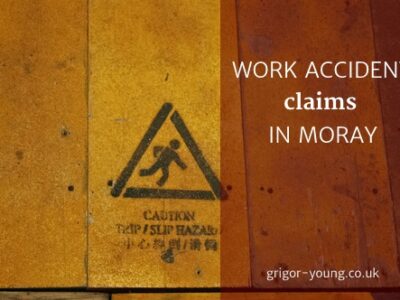An accident at work can have devastating consequences for you and your family. Unfortunately, serious – even fatal – workplace accidents are as possible in Moray as elsewhere and it’s a sobering thought that your life might be changed forever by injuries sustained just because you went to work.
The legal duties on employers
The law recognises that working is a risky business. That’s why employers have a legal obligation to protect their employees – and why you can legitimately expect to go to work in safety.
Depending on the nature of your workplace, the premises provided to you and your activities at work will be classified by the risks associated with them. So, for example, an office would be reckoned to be “low risk”, whereas a building site would be “high risk” – for obvious reasons.
Whether your job is low risk or high risk, employers have to undertake risk assessments to identify hazards and risk factors. An employer must consider and implement plans to limit any risk, as far as possible.
Nevertheless, even when these risks have been identified and tackled, things can still go wrong and accidents occur.
Making a claim for personal injury compensation
If you are injured in an accident at work, you may be able to make a claim for compensation from your employer for your injuries and other losses (e.g. loss of earnings). Some people feel intimidated by the prospect of making a claim against their employer. They fear that they will be demoted or sacked, as a result. However, all employers have insurance in place to cover them in such circumstances. It is a criminal matter if they fail to have employer’s liability insurance cover. And, if they try to treat you differently, as a result of making a compensation claim as a result of an accident at work, they risk falling foul of employment law rules regulating fair treatment at work.
You can maximise your chances of getting the best possible outcome for your claim by using a specialist work accident solicitor. You should discuss the accident in detail with them so they can advise you whether you have good grounds for a successful claim or not.
Progressing the claim
Your solicitor will notify your employer about the claim. From there, he or she can discuss the possibility of a negotiated settlement of your claim with your employer’s insurance company.
If you contributed to your injuries, for example, by not using designated work equipment for a job and failing to wear proper personal protective equipment (PPE), it does not remove your right to claim. In the worst case, your compensation will be reduced by a percentage to take into account the extent of your contribution. A specialist solicitor will be able to minimise the effect of “contributory negligence” on your claim. Insurers tend to argue that a deduction should apply in many situations where none is appropriate. Your solicitor will keep you right.
Among other things, you can claim compensation for –
- the pain and suffering caused by your injuries,
- any absence from work for which your employer has not paid you
If you have life changing injuries, compensation will include payments for things like –
- adaptations to your car or home,
- future loss of earnings (if you cannot work again),
- equipment, and
- rehabilitation costs.
How we can help
For more information about this article or any aspect of our accident and injury claims services, please call us on 01343 544077 or send us a Free Online Enquiry. We will be delighted to help you. There is no charge for initial telephone discussions.
We always recommend getting help from a local solicitor, if you can, and we are best placed to help you if you have suffered an accident at work in Moray or if you live in the Moray area.
One of our civil court solicitors, Peter Brash, is accredited as a Specialist in Personal Injury Law by the Law Society of Scotland. Both Peter and his colleague, Marie Morrison, are accredited by the Association of Personal Injury Lawyers (APIL) as Senior Litigators. Additionally, the Elgin branch of Grigor & Young has corporate accreditation from APIL.


 Third Party Capture In Personal Injury Claims (Help From A Wolf In Sheep’s Clothing)
Third Party Capture In Personal Injury Claims (Help From A Wolf In Sheep’s Clothing)